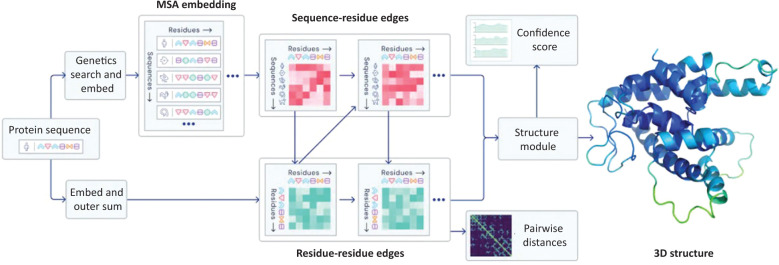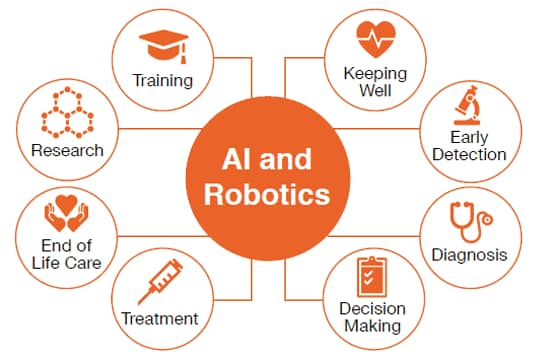Transforming Healthcare with Cutting-Edge AI Innovations
Dec 15, 2024The integration of Artificial Intelligence (AI) is rapidly revolutionizing healthcare delivery and research. Multiple sources highlight AI's transformative potential across various aspects of the healthcare ecosystem.
Transforming Healthcare with Cutting-Edge AI Innovations
The integration of Artificial Intelligence (AI) is rapidly revolutionizing healthcare delivery and research. Multiple sources highlight AI's transformative potential across various aspects of the healthcare ecosystem.
AI's Impact on Healthcare Delivery and the Workforce
A McKinsey report, "Transforming healthcare with AI: The impact on the workforce and organizations," emphasizes AI's potential to improve care outcomes, patient experience, and access to healthcare services. It can boost productivity and efficiency, enabling healthcare systems to provide more and better care. AI can also enhance the experience of healthcare practitioners, allowing them to dedicate more time to direct patient care and reducing burnout.

The McKinsey report further details the challenges facing healthcare systems, including growing demand, rising costs, and workforce shortages. AI offers solutions by automating routine tasks, augmenting clinical activities, and improving access to information, ultimately leading to better patient outcomes and higher quality of care. The report also anticipates the emergence of new healthcare professions at the intersection of medicine and data science.
A separate article, "Artificial intelligence in healthcare: transforming the practice of medicine," published in the Future Healthcare Journal, reinforces these points, emphasizing AI's role in addressing the "quadruple aim" of healthcare: improving population health, patient experience, caregiver experience, and reducing costs. The article provides a roadmap for building effective, reliable, and safe AI systems in healthcare, highlighting the importance of a human-centered approach and iterative experimentation.


This article also explores various current and future use cases of AI in healthcare, including precision diagnostics (e.g., diabetic retinopathy screening, radiotherapy planning), precision therapeutics (e.g., immunomics, AI-driven drug discovery), and precision medicine (e.g., new curative therapies, AI-empowered healthcare professionals).

AI in Practice: Real-World Examples
PwC's publication, "Transforming healthcare," showcases eight ways AI and robotics are transforming healthcare: improving preventative care, enabling early disease detection, assisting with diagnosis, supporting decision-making, enhancing treatment, revolutionizing end-of-life care, streamlining drug research, and improving training.

eClinicalWorks highlights its integration of cutting-edge AI tools into its EHR system, including AI medical scribes, AI assistants, image AI, RPA, and a no-show prediction model. These tools are shown to improve clinical documentation efficiency, streamline workflows, and enhance patient care. Specific examples from various healthcare practices demonstrate the positive impact of these AI solutions.

An India Today article features an interview with Ayush Tomar, a data science and machine learning expert in healthcare. Tomar discusses the use of AI for personalized patient care, data-driven policy decisions (e.g., addressing vaping addiction), and improving patient experiences through AI and LLMs. He also addresses the challenges and opportunities in handling healthcare data, emphasizing the importance of privacy and ethical considerations.
Finally, a Microsoft blog post announces the public preview of Microsoft healthcare AI models in Azure AI Studio and GitHub, offering cutting-edge multimodal generative AI models for healthcare and life sciences. This platform aims to empower developers and researchers to build more efficient and cost-effective healthcare solutions. The post also highlights advancements in healthcare data solutions within Microsoft Fabric and the public preview of a healthcare agent service integrated into Microsoft Copilot Studio.

These sources collectively illustrate the significant and multifaceted impact of AI on transforming healthcare, from improving individual patient care to optimizing healthcare systems and driving policy decisions. The emphasis is consistently placed on responsible AI development and deployment, prioritizing patient privacy, ethical considerations, and the overall enhancement of the healthcare experience.
Exploring the Landscape of AI Web Browsing Frameworks
Published Jan 24, 2025
Explore the landscape of AI web browsing frameworks, from browser-integrated assistants to dedicated automation platforms. Learn how these tools are transforming the web experience with intelligent content extraction, task automation, and user-friendly interfaces....
OpenAI Operator: A New Era of AI Agentic Task Automation
Published Jan 23, 2025
Explore OpenAI Operator, a groundbreaking AI agent automating tasks by interacting with computer interfaces. Discover its capabilities, limitations, and impact on the future of AI....
React OpenGraph Image Generation: Techniques and Best Practices
Published Jan 15, 2025
Learn how to generate dynamic Open Graph (OG) images using React for improved social media engagement. Explore techniques like browser automation, server-side rendering, and serverless functions....